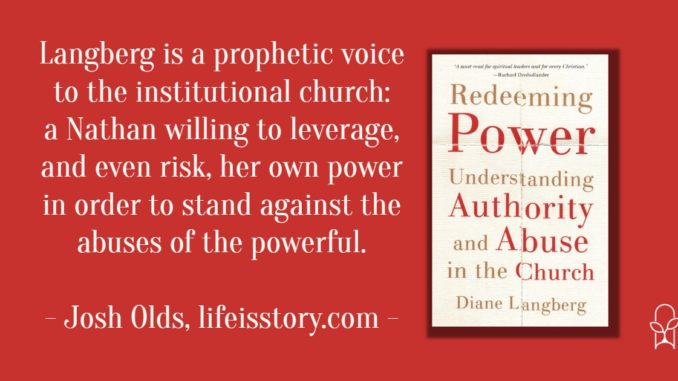
Also by this author: Redeeming Power: Understanding Authority and Abuse in the Church
Published by Brazos Press on October 20, 2020
Genres: Non-Fiction, Christian Life, Leadership
Buy on Amazon
Goodreads

Power has a God-given role in human relationships and institutions, but it can lead to abuse when used in unhealthy ways. Speaking into current #MeToo and #ChurchToo conversations, this book shows that the body of Christ desperately needs to understand the forms power takes, how it is abused, and how to respond to abuses of power.
Although many Christians want to prevent abuse in their churches and organizations, they lack a deep and clear-eyed understanding of how power actually works. Internationally recognized psychologist Diane Langberg offers a clinical and theological framework for understanding how power operates, the effects of the abuse of power, and how power can be redeemed and restored to its proper God-given place in relationships and institutions. This book not only helps Christian leaders identify and resist abusive systems but also shows how they can use power to protect the vulnerable in their midst.
I am a pastor and a gymnastics coach. Over the past several years, I have seen both of these areas explode with revelations of abuse of power. Gymnastics, of course, has been rocked with physical and sexual abuse scandals and a coverup by the highest levels of USA Gymnastics. The church has also faced its own #MeToo reckoning in #ChurchToo and the failures (and coverups) of the abuse of power from prominent pastors and leaders.
There is a connection between power and abuse. Until we understand the link between authority and abuse, our systems and institutions will continue to fall into the same trap of enabling, even encouraging, ignoring, and then covering it all up. Particularly for those who hold power and authority, much work needs to be done to understand how that power and authority might be tested and where there might be temptations to fall into abusive behaviors.
Diane Langberg’s Redeeming Power goes a long way in the journey to provide this understanding. With incisiveness and grace, Langberg wields her pen like a scalpel to cut away the cancer of power abuse within the church. She doesn’t hold back. There’s no hesitation to talk about the things that the church only ever talks about in hushed tones, because she realizes that the failure to speak out is what enables and empowers the abuse to continue.
The first part of Redeeming Power defines the meaning of authority and power, tracing its purpose, roots, and inherent corruptibility. Langberg focuses on all sorts of power structures from big to little, political to personal, systemic to individual. This approach keeps readers from becoming hyper-focused only on physical abuse or sexual or abuse in the workplace. Any place there is power, there is the potential for abuse.
This was very helpful for myself as a white(!), male(!) pastor(!). As a white person, I am part of the cultural majority, which gives me power. As male, my gender holds cultural authority, which gives me power. And as pastor, I am ordained with authority recognized by both the church and state. The first two aren’t even things that I asked for, but are simply a part of living in the culture I live in. So, as a white male, I have to recognize the cultural authority I have (even if I do not believe it to be warranted), because without recognizing that I could potentially abuse an authority I wasn’t fully cognizant I had. Further, I could learn to use that power positively and leverage my influence to give power to other people.
The second part—and the majority—of Redeeming Power explores various aspects of the abuse of power. Chapter six deals with systemic injustices. Seven deals with male/female power imbalance within the workplace, culture, church, and family. Eight applies the power imbalance to racial issues and racialized systems. Nine speaks specifically to power abuse within the church. Again, Langberg wisely keeps readers from becoming hyper-focused on only one particular form of power abuse. Readers who might dismiss the reality of gendered power imbalance might readily recognize racial power imbalance, or vice versa. By speaking broadly to many categories and offering an implicit cross-comparison, Langberg forces readers into a holistic conversation about abuse of power and helps readers recognize their own blind spots to certain iterations of power abuse. The most poignant chapter, for me, was the discussion of Christianity’s seduction by power, political power in particular.
The final part, the most important, is a blueprint for redemption. I do wish that Langberg had been a bit more specific about what redemption looks like in practical terms. How do we restore those who have abused their authority? How do we handle the legacy of leaders who made worthwhile contributions to their fields but also engaged in egregious abuses of power? Redeeming Power stays more on the side of the theoretical and exhortative and does not offer many practical specifics.
In the end, Langberg offers this devastating conclusion:
I have learned during my decades as a psychologist that you can tell what is most important to someone by what they protect most vociferously…Looking at Christendom today, I frequently see that when the church is threatened, its energy goes into protecting the system. We love and worship the system or our church more than we love and worship Jesus Christ. That is why we engage in complicity, in cover-ups, in silencing, in name-calling, and in threats…The goal is to protect the institution, not stand in the light…He has called us to follow him, even if our temples collapse.
Redeeming Power has the ability to revolutionize the way leaders lead and reset the system to protect the empowered from abusing and the vulnerable from abuse. Langberg is a prophetic voice to the institutional church—a Nathan willing to leverage, and even risk, her own power in order to stand against the abuses of the powerful.
